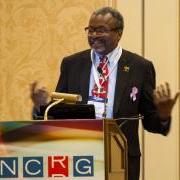The NCRG has named Randy Stinchfield, Ph.D., L.P., associate director of the Center for Adolescent Substance Abuse Research in the department of psychiatry at the University of Minnesota Medical School, the recipient of the NCRG 2012 Scientific Achievement Award in recognition of his pioneering contributions to the field of research on rambling disorders. Dr. Stinchfield was honored at an awards luncheon on October 1, 2012 during the13thannual NCRG Conference on Gambling and Addiction. You can watch his acceptance speech below or on theNCRG’s YouTubechannel.
Dr. Stinchfield has conducted some of the earliest and most significant research on youth gambling, including the first youth gambling survey in the U.S. He is the co-author of one of the most widely used instruments for youth gambling assessment around the world, named the South Oaks Gambling Screen Revised for Adolescents (SOGS-RA). In a related track, Dr. Stinchfield has analyzed gambling behavior based on Minnesota Student Survey data administered to nearly all ninth- and 12th-grade public school students in the Minnesota every three years since 1992, which is now the largest database of youth gambling information in existence.
Dr. Stinchfield is a leading researcher in investigating the accuracy of instruments intended to measure and diagnose gambling problems, including the South Oaks Gambling Screen (SOGS) and the Diagnostic and Statistical Manual of Mental Disorders (DSM-IV) diagnostic criteria for pathological gambling, the most commonly used assessment instruments for both epidemiological and clinical work. He has calibrated the classification accuracy of both the SOGS andDSM-IV, which has led to a greater understanding of reported prevalence rates using these instruments.
Additionally, he conducted one of the first gambling treatment outcome studies. Aware of the lack of assessments tools to track the effectiveness of treatment, Dr. Stinchfield and his colleagues developed the Gambling Treatment Outcome Monitoring System (GAMTOMS), which has been used to evaluate gambling treatment in Minnesota and across the nation.
Beyond his research, Dr. Stinchfield contributes to the field by serving on the editorial boards of a number of peer-review journals, and serves as a board member of Northstar Alliance for Problem Gambling.
On behalf of the NCRG, the NCRG blog team would like to congratulate Dr. Stinchfield!
NCRG staffConference on Gambling and AddictionConferencegambling disordersresponsible gamingscientific achievement awardyouth gambling



